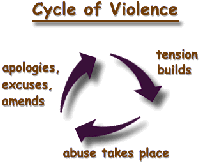Teens
Dating Violence is any intentional sexual, physical or psychological attack on one partner by the other in a dating relationship. This definition reflects the belief that all forms of abuse are harmful and need to be taken seriously. Abuse does not have to leave a mark. The wounds that emotional abuse leave, cut deep and can leave your self esteem in critical condition. Dating Violence is about power and control, not respect or love. A victim of dating violence may think he or she can fix the relationship or that it will get better over time, however the relationship can become trapped in the cycle of violence, and be difficult to break on your own. Abuse is a taught behavior and repeats itself within families. The statistics are alarming; 1 in 4 teens will be involved in a violent dating relationship. Awareness is key to prevention. Watch this 13 minute video from Choose Respect to increase your awareness about teen dating violence.
Feelings are the first sign and easy to recognize. In a healthy relationship, a partner might feel important, special, attractive, respected and happy. Feelings of confusion, anxiety, sadness, hopelessness, scared, lost and disrespected are common in an unhealthy relationship. Other warning signs include:
- Jealousy
- Controlling or possessive Behavior
- Yelling or screaming at you
- Calling you names or putting you down
- Twisting things around to blame you
- Ever pushed, slapped, or kicked you
- Show explosive anger (punching holes in walls)
- Criticize the way you look or dress
- Threaten that you’ll be all alone without them
- Are you afraid of their “moods?”
- Do you feel pressured into sexual activity?
- Have you given up hobbies or relationships with other friends?
- Fear their parents won’t take their concerns seriously
- Fear of judgment
- Fear they will get privileges taken away (won’t be able to date again)
- Fear their abusive partner may hurt them or their family if they tell
- Fear their parents won’t respect their decision if they choose to stay in their unhealthy relationship
- Fear of embarrassment

Remember that abuse is about power & control when talking to your teen. He or she may already feel controlled and may push against any suggestions you have in fear of being controlled even more. Give choices and respect their decisions. He or she may have not yet acknowledged that they are in an unhealthy relationship. Keeping the cycle in mind, it is best to start this conversation before the “makeup phase.”
- Listen to her/him with undivided attention
- Ask questions; find out their concerns and fears
- Believe what she/he is telling you
- Validate her/his feelings and strength. By disclosing to you, she/he has just taken a major step in dealing with the pain of relationship violence
- Help her/him create a safety plan
- Help her/him to understand that the violence is not their fault and that it’s okay to talk about the problem
- Provide helpful resource information
- Protect her/his right to confidentiality
- Support her/his right to make their own choices
- Do not try to “rescue” your teen or be a hero and try to handle the situation on your own Safety Plan
- Stay in touch with friends & stay involved in activities you enjoy.
- Consider telling a family member about what is happening.
- Try not to be alone. Tell your friends about the abuse and have them walk to classes with you and spend time during lunch with you.
- Always keep extra change or a cell phone with you so you can make a call for help.
- Change your routine. Don’t always come to school the same way or at the same time. Always have someone with you.
- Try not to be alone with the abuser. Do not go by yourself to an isolated or deserted location.
- Break up with your partner in a public place. Let other people know that you plan to break up with your partner and let them know where you will be and when.
www.fcadv.org
www.chooserespect.org
www.promotetruth.org
www.loveisrespect.org
Teen Dating Violence Hotline: 1-866-331-9474
If you have questions about teen dating violence, please email us at act@actabuse.com.







